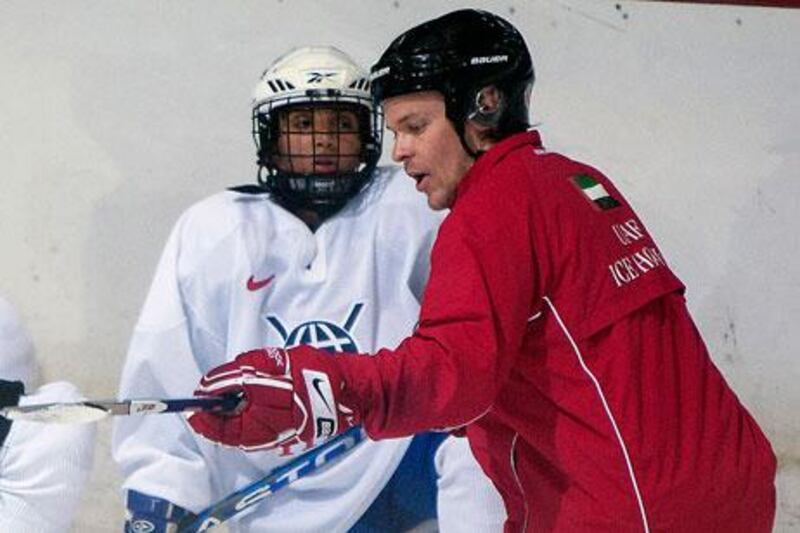The great strides taken by the UAE in the development of ice hockey can act as a catalyst for an explosion of interest in the sport across the Gulf region, according to the country's top coach.
To help this growth, the Emirates has invited teams from Kuwait, Qatar and Oman to take part in the inaugural Abu Dhabi International Tournament for the Capital Cup, a 12-team competition to coincide with the 40th National Day anniversary celebrations.
"The UAE have a well-funded and well-structured development programme and already have taken the sport to a new level, not only in the region but in Asia," said Matti Fagerstrom, the head of coaching for the Abu Dhabi Ice Sports Club, the official body for the sport in the country.
He doubted other countries in the region can match UAE's development strategy, which is based on the recommendations of the International Ice Hockey Federation (IIHF).
"I know the national team of Kuwait has the potential to improve, but I am not too sure if they have the same kind of backing the UAE enjoy," said the Finn, who travelled to Kuwait as the UAE coach for the IIHF Challenge Cup of Asia in April.
"I am not sure of their junior programme, but they have a strong senior national team. They have got the infrastructure, an Olympic-size rink and a smaller area for skating. So, if they want to develop and popularise the sport, they can.
"I have been to Qatar but there the game is more of an expatriate sport. I travelled with the UAE Under 18 team and their [Qatar's] juniors were under prepared. They were beginners and lacked proper preparation.
"Qatar have also got a problem because their rink is in a mall and the demand for it doesn't provide the ice time for hockey."
Fagerstrom said the Capital Cup, currently underway, was another chance to create awareness and enhance the popularity of the sport. "More competition means more playing opportunities," he said.
"This competition is different to the league and you get to play some unknown teams as well. The format also allows the weaker teams an opportunity to win."
The competition is to be contested in three divisions according to the strengths of the team.
The Union 40 Cup will be for the top four teams in the Emirates Hockey League (EHL) - the Dubai Mighty Camels, Abu Dhabi Storms, Abu Dhabi Scorpions and Al Ain Theebs.
The second division is for the Theyab Awana Cup and the lower division for the Saeed Al Noubi Cup, named after the two young footballers who were killed in car accidents recently.
The Al Ain Vipers, Qatar Qanucks, Dubai Buds and Moosehead of Kuwait are the middle division teams while Godfather, Gensler, Wadi Dogs of Oman and Qatar Qanucks are the four teams in the lower tier competition.
"We have had two similar events staged by a private organisation but this is the first time by us," said Ali Al Hosani of the ADISC.
"We are hopeful this competition will become an annual one in our calendar of events.
"This is a good start, and we would like to see it grow as well.
"And perhaps, someday, draw top flight international teams."
In other newse, the EHL Under 20 season starts on November 26 with four teams in taking part, two from Abu Dhabi, Storms and Shaheen and one each from Al Ain and Dubai, Theebs and Sandstorms.
Fagerstrom said: "The junior league will be worked off in the same format as the seniors with each team playing 18 games in the group stage.
"And since there are only four teams, all four will go into the play-off with the top team playing the bottom team and then the second versus the third."
Follow
The National Sport
on
[ @SprtNationalUAE ]
& Amith Passela on
[ @AmithPassela ]






